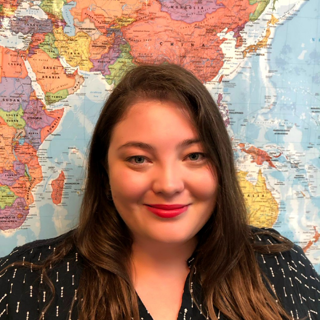How did you get to where you are now?
I’ve been working in the student mobility sector for over four years now, but as it can be quite a niche field, it took several years of work experience to get my foot in the door, which is a similar story for many in the sector.
I studied Development Studies and International Relations and took a range of classes focusing on human geography, politics, culture, regional studies and religion during my undergraduate degree. I spent the last year of my degree on exchange which I loved. I gained so much personally, socially and academically from the experience and felt privileged to have the opportunity to study at another institution.
Over the next few years, I took a range of administrative roles at travel companies, charities and academic organisations, building my general professional experience. I then moved to the UK to undertake a Masters in Cultural Geography - a long held dream since my exchange days. After finishing my postgraduate studies, I was fortunate to be offered a maternity cover position at a small private university in London as their International Programmes Coordinator. After my UK work visa expired, I moved to Australia and have since held student mobility roles at two Australian universities.
What do you do as part of your role?
I oversee the portfolios for Europe and South Africa, which means I manage the day to day requirements for all universities in these regions. What I do in a typical week usually involves relationship management, student support and communications, media and events. I am in constant communications with my colleagues from around the world at our partner universities and ensure that we are maintaining a good relationship with these universities. Alongside this, I assist students with academic and pastoral concerns and provide developmental advising, so a good chunk of my working week is spent in one-to-one student meetings.
Plus, I regularly run information sessions for prospective students, so do a lot of public speaking. I ensure that the website and social media content for my portfolios is up to date and active and at certain points in the year, I’m also involved in orientation and pre-departure events, as well as our annual Global Opportunities Fair.
What skills and characteristics do you need for this role, apart from geographical knowledge?
Empathy is one of the most important characteristics you’ll need for a career in student mobility. You’ll be supporting students through transformative international experiences, which can be the best experience of their lives, but can also involve lost passports, visa nightmares and homesickness.
It’s also essential that you have strong attention to detail, the ability to be adaptable, be patient, have great written communication and good time management skills.
How does geography feature in your work/what difference does it make?
Geography is everything in my role! The cultural geography aspects of travel, tourism and government borders affect everything from student accessibility, visa processing timelines and/or requirements and quantitative trends in terms of where students are interested in going and the experiences my students have whilst they are overseas and when they come to Melbourne.
Do you get to travel for your role?
During my four years in student mobility, I’ve gone on work trips to Greece, Lebanon, France (twice!), Germany and Malaysia. The nature of these trips usually revolves around recruitment fairs and promoting your university overseas.
What are the opportunities for career progression?
Student mobility is a growing field and there are many central and faculty based roles available at universities. There is also a good amount of diversity in terms of what you can do, and the programmatic elements you focus on, and whether you wish to work with inbound or outbound student populations.
In terms of progression, as you rise in seniority, you will increasingly find yourself working in senior roles focused on strategic partnerships, operations management and systems analyst roles. The nature of student mobility helps you build broad skills, so there is a lot of exciting future opportunities you can move into as you progress!
What advice would you give to someone wanting to go in to this career?
For that first step in the door, short term contracts or maternity cover contracts are a great way to build your experience whilst getting to know the sector. A lot of people in the industry, myself included, get into the field via maternity cover contracts.
I would also say that student mobility is a fantastic and positive area to work in. You are supporting and helping students to have an amazing experience and it can be very heart-warming to help them along the journey to have this transformative time abroad. The international element keeps things interesting and I am constantly learning new and obscure facts about countries all over the world on a daily basis.
Why did you choose geography? Why should others choose geography?
I’ll always be grateful to have studied geography – the chance to take such a broad degree which allowed me to learn more about politics, culture, sexuality, religion and so many other topics made me a better person and gave me a critical insight into the world around us. Being a geography graduate has assisted me in some shape or form in all the roles I have held during my career. I firmly believe that the more geography students there are in the world, the better the world will be!
* This interview was undertaken in 2019 and was correct at the time of publication. Please note that the featured individual may no longer be in role, but the profile has been kept for career pathway and informational purposes.

